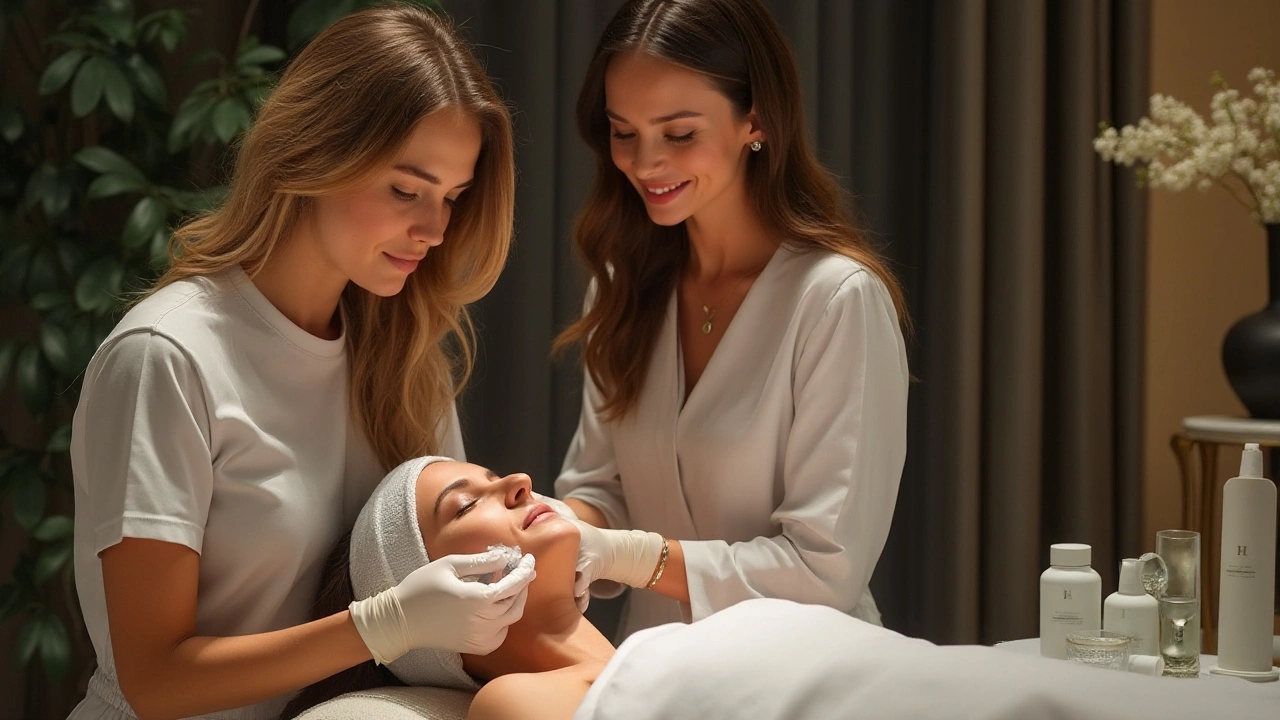In the world of beauty and skincare, the titles 'aesthetician' and 'beauty therapist' are often tossed around, yet they embody different aspects of this glamorous industry. While both professions thrive on making clients feel and look their best, their focus areas and techniques can vary significantly.
Whether you're eyeing a career path in beauty or simply want the best treatment for your skin, understanding what sets these two roles apart is crucial. From the depths of skincare treatments to the intricacies of relaxation therapies, this article sheds light on these professions to help guide your choices, whether you wish to become a skincare expert or are seeking the perfect specialist to meet your beauty needs.
- Defining the Roles
- Training and Education
- Areas of Expertise
- Services Offered
- Career Opportunities
- Choosing the Right Professional
Defining the Roles
When we talk about beauty professionals, the terms aesthetician and beauty therapist often come up, and understanding their distinctions is essential for anyone either entering this booming industry or seeking their expert services. At its core, an aesthetician is a skincare specialist focusing on advanced techniques and treatments to enhance the skin's health and appearance. They are trained in a plethora of treatments such as facials, microdermabrasion, and chemical peels, making them the go-to experts in skincare. An aesthetician’s toolkit is often filled with cutting-edge devices designed to treat issues ranging from acne to aging signs, employing technologies like laser therapy and LED light treatments.
On the other hand, a beauty therapist often takes on a more holistic approach, offering a wide range of beauty services that extend beyond skincare. Their training covers not only the face but the entire body, including body wraps, massages, manicures, and even makeup application. This role is about enhancing overall beauty and well-being through various pampering techniques, aiming for relaxation and rejuvenation. An aesthetician’s work leans towards the clinical, whereas a beauty therapist blends beauty with wellness, creating an experience aimed at both looking good and feeling great.
An insightful quote by Rebecca Taylor, a certified beauty expert, encapsulates this well:
"While aestheticians focus on the health of the skin, beauty therapists offer a retreat for the mind, body, and spirit, harmonizing beauty with tranquility."For anyone trying to decide between these professions, the key is to understand not just the services offered but the underlying philosophy each role adopts towards beauty care. Aestheticians often require specialized training and certification in skincare techniques, while beauty therapists may have a broader training cover, including spa management and customer service excellence.
In many beauty academies, the curriculum for beauticians includes modules that introduce them to various tools and cosmetics, providing them with the expertise to deliver comprehensive beauty services. As such, those with an interest in holistic beauty practices and a variety of treatments may find themselves drawn to becoming a beauty therapist, while individuals passionate about skin science and quality skincare might pursue the path of an aesthetician. In both cases, the demand for these roles continues to grow as more people seek professional help in enhancing their appearance and ensuring their skin remains healthy and vibrant for years to come.
Training and Education
When it comes to pursuing a career in the beauty industry, understanding the training and education paths for both aesthetician and beauty therapist roles is essential. Aspiring aestheticians often embark upon a journey that centers heavily on the science of skin. Typically, this involves attending cosmetology schools or specialized training centers where the focus is intensely on skin health, disorders, and advanced facial treatments. Most programs for aestheticians run between 300 to 1000 hours of study, which usually depend on state or regional regulations. In addition to practical skills, students delve into anatomy, physiology, and chemistry related to skincare products to be well-equipped for diagnosing and treating skin conditions effectively.
On the other hand, training for a beauty therapist is generally more comprehensive, covering a wider array of beauty treatments. Their education includes not just skincare, but also areas such as nail technology, body hair removal techniques, and massage therapies. The coursework spans several months to a couple of years, often including both theoretical study and hands-on experience. This broad training equips beauty therapists to perform multiple services within a salon or spa environment. In many regions, beauty therapists are required to hold diplomas or certificates in beauty therapy, which are recognized by professional bodies that ensure the standardization of skills and knowledge.
In certain countries, such as the United Kingdom, the National Vocational Qualifications (NVQs) or equivalent frameworks are typical educational pathways for both professions. NVQ Level 2 and Level 3 in Beauty Therapy provide fundamental and advanced skills needed in the beauty industry. A well-regarded institution might say,
"Our curriculum not only builds core competencies but also fosters innovation and creativity in beauty therapy," perhaps emphasizing the importance of creative thinking alongside technical skills in beauty.Upon completion of these courses, professionals may pursue additional certifications in specialized treatments, such as microdermabrasion or aromatherapy, enhancing their service offerings and career prospects.
Given the dynamic nature of the beauty industry, continuous professional development is common among both skincare specialists and beauty therapists. Workshops, seminars, and additional certifications are part of their lifelong learning process. Many professionals choose to stay informed about the latest skincare treatments, beauty technologies, and trends. Some training centers offer workshops focusing on the latest technologies and techniques to ensure their trainees remain at the cutting edge of the industry.
Another interesting aspect is the role of digital platforms in their education. Online courses and virtual workshops have become valuable resources, providing flexibility and access to a broader range of educational content. Whether you’re aiming to become an aesthetician or a beauty therapist, getting a well-rounded education prepares you for a fulfilling career that thrives on passion, precision, and a commitment to excellence in client care.

Areas of Expertise
The roles of an aesthetician and a beauty therapist often overlap, yet each possesses unique expertise. Aestheticians specialize in skincare treatments that delve deeply into improving the skin's health. Their knowledge in this field allows them to provide advanced services such as chemical peels, microdermabrasion, and acne treatments, which are tailored to individual skin types and conditions. The objective is to rejuvenate the skin, tackle blemishes, reduce fine lines, and achieve a radiant complexion. A testament to this specialization is the fact that aestheticians often work under the supervision of dermatologists or in clinical settings, emphasizing corrective skincare solutions.
Beauty therapists, on the other hand, are regarded as the Swiss Army knives of the beauty industry, possessing a broader skill set that incorporates both cosmetic and therapeutic practices. Their training encompasses a variety of services beyond skincare, including nail technology, eyelash extensions, and body treatments like massages. They aim to enhance the client's physical appearance and promote relaxation and well-being through beautifying techniques. This versatility extends to spa settings where they might offer a day of pampering, combining facials with body wraps and manicures. According to the International Therapy Examination Council (ITEC), beauty therapists integrate skincare with treatments like aromatherapy, offering a holistic approach to beauty and relaxation.
Significant Techniques and Treatments
Each profession's techniques are rooted in their distinct focus areas. Aestheticians often employ specialized tools and procedures designed for skincare health improvement. Techniques such as LED light therapy or lymphatic drainage facials are part of their arsenal. These methods not only target the skin surface but work on deeper layers, influencing collagen production and blood circulation. By contrast, beauty therapists might incorporate a wide range of techniques in a single session, reflecting their extensive training. Their sessions can include Swedish massage techniques interspersed with exfoliative facial treatments or manicures, emphasizing relaxed sophistication.
Statistics reveal the growing preference for specialized treatments in both fields. A report by the Global Wellness Institute suggests that there is a rising demand for personalized skincare solutions and comprehensive beauty packages, mirroring the unique skills these professionals bring to the table. While both roles contribute significantly to the beauty landscape, their expertise caters to different facets of personal care, ensuring that clients always have access to a broad spectrum of beauty and wellness options. This guarantees that no matter the client’s preference or requirement, they can find effective treatments tailored to their unique needs. Such diversity in services and expertise plays a fundamental role in the expansive nature of the beauty industry today.
"Understanding the depth of expertise each professional brings allows clients to make informed choices about their skincare and beauty treatments," says Anna Wintour, an esteemed authority in the fashion and beauty world.
Services Offered
When delving into the specific services offered by aestheticians and beauty therapists, you'll notice a fascinating array of treatments aimed at enhancing and nurturing the skin's health and appearance. An aesthetician typically specializes in skincare treatments like facials, peels, and extractions. They are adept at analyzing skin types and conditions, tailoring treatments to address individual concerns such as acne, hyperpigmentation, or dryness. Technology plays a significant role in their treatments; they may use devices for microdermabrasion, LED therapy, or laser treatments, providing a science-backed approach to skin improvement.
Beauty therapists, on the other hand, offer a broader spectrum of treatments that extend beyond skincare. While they do provide facial treatments, their scope includes body therapies such as full-body massages, body wraps, and scrubs. These treatments don't just cater to skin enhancement but focus on relaxation and overall well-being. A beauty therapist may also be skilled in hair removal techniques like waxing or sugaring, as well as nail care, where they demonstrate creativity and precision through manicures and pedicures that both soothe and style.
To understand the intricacies of these treatments, consider the thoroughness of a beauty therapist's regimen. The process of a full-body massage, for instance, involves a deep understanding of muscle anatomy, as well as the use of different pressure techniques to relieve stress and tension. Aesthetician processes, however, often rely on a scientific approach. For example, chemical peels may require knowledge about concentrations of acids and their effects on various skin types, ensuring that post-treatment, the skin is not only rejuvenated but thoroughly protected from future environmental damage.
As Dr. Ava Shamban, a notable dermatologist, succinctly observes, "The skin is a living organ, and treating it requires both science and a bit of artistry. Whether through the hands of an aesthetician or a beauty therapist, the goal remains to enhance its natural beauty."
For many clients, selecting the right professional is about finding the right mix of skincare specialist expertise and therapeutic flair. Some aestheticians may collaborate with dermatologists to offer medical-grade treatments, while beauty therapists might partner with spas to provide a holistic relaxation experience. Understanding these distinctions can guide clients in choosing the right path, ensuring that their beauty and wellness goals are effectively met.

Career Opportunities
The journey into the world of beauty, whether as an aesthetician or a beauty therapist, offers a plethora of rewarding career paths. These professions open doors to numerous environments, each with unique experiences and challenges. From upscale spa settings to bustling dermatology offices, the skills acquired in these fields are versatile and highly sought after. One could start their career in a small local spa, catering to friendly neighborhood clients, and eventually transition to high-end beauty boutiques or even medical esthetics, providing skincare treatments prescribed by dermatologists.
Both aestheticians and beauty therapists find roles in wellness centers and luxury hotels that demand exceptional service quality and specialized knowledge. Aestheticians, in particular, have the opportunity to work closely with skincare lines and cosmetics companies, often becoming product representatives who travel to educate other professionals and customers on specific product benefits. Beauty therapists, on the other hand, may explore roles in holistic health centers where their expertise in therapeutic massage and body treatments becomes invaluable.
The education from beauty therapy courses provides the foundation for those looking to branch out into niche markets like media or theatrical makeup artistry, where creativity meets technical skill. According to the U.S. Bureau of Labor Statistics, employment of skincare specialists, which includes aestheticians, is projected to grow 17 percent through 2031, much faster than the average for all occupations. This uptick demonstrates the increasing demand for specialized beauty professionals in diverse sectors.
As Linda Wells, founding editor of Allure magazine, once stated, "Beauty is about enhancing what you have. Let yourself shine through!" This mantra is what drives many in the beauty industry to continuous learning and adapting to new beauty trends and technologies.
Branching out, some professionals become entrepreneurs, opening their own salons or beauty consulting businesses, offering personalized services that cater to a growing trend of uniqueness in beauty standards. The rise of online platforms has also provided beauty experts with a stage to offer webinars, tutorials, and courses. This digital pivot has become an excellent opportunity for aestheticians and beauty therapists to capitalize on their skills and reach a global audience.
Whether you aim to work for a notable brand, set up your own practice, or make your mark in the virtual world, both aesthetics and beauty therapy offer career trajectories that can align beautifully with personal passions and ambitions. As the beauty industry continues to evolve with fashion trends, technological advancements, and changing consumer preferences, these professionals remain at the forefront, helping individuals everywhere achieve their beauty goals.
Choosing the Right Professional
When it comes to picking the right expert for your beauty needs, the choice between an aesthetician and a beauty therapist should be informed by your specific desires and skin concerns. Although both roles aim to enhance beauty, their areas of specialization can make a significant difference in the results you'll receive. It's essential to consider the specifics of treatments required and how each professional's expertise aligns with your beauty goals.
First and foremost, assess the type of service you are seeking. If you're looking for advanced skincare routines that delve deep into dermatological procedures, an aesthetician might be your best bet. They typically have a profound understanding of skin biology and are trained in treatments like dermabrasion, chemical peels, and laser therapies. For general relaxation and overall beauty enhancement, a beauty therapist could be more suitable. Beauty therapists offer services ranging from massages to aromatherapy that focus on wellness and relaxation rather than medical-grade treatments.
As noted by the Bureau of Labor Statistics, "Estheticians and skincare specialists require technical skills that involve not only a deep understanding of skin health but also practical knowledge of the tools and products that can best maintain and enhance it."
Next, consider the professional's training and experience. A well-trained aesthetician often holds a certification from a recognized institution, focusing heavily on science-based learning and clinical practice. This rigorous training ensures they are capable of handling complex skin issues with precision. Beauty therapists usually receive broader training that encompasses skills for various treatments and stress relief techniques, often allowing them to offer a more holistic approach to care.
Questions to Ponder
- What is the specific skin or beauty issue you want to address?
- Are you looking for medically inclined solutions, or is your focus more on relaxation and pampering?
- Does the professional have a reputable background or testimonials from previous clients?
Finally, it's worth seeking recommendations from trusted sources or reading online reviews. Experiences of previous clients can shed light on what you might expect from services rendered by either professional. Remember, communication is key. Don’t hesitate to discuss your goals and expectations with your chosen professional during an initial consultation. Whether you decide on an aesthetician or a beauty therapist, finding someone who listens and understands your needs will transform your beauty experience into a truly rewarding venture. Being informed is your best tool for making the right choice, and now with this knowledge, you're one step closer to achieving your beauty aspirations.





Write a comment